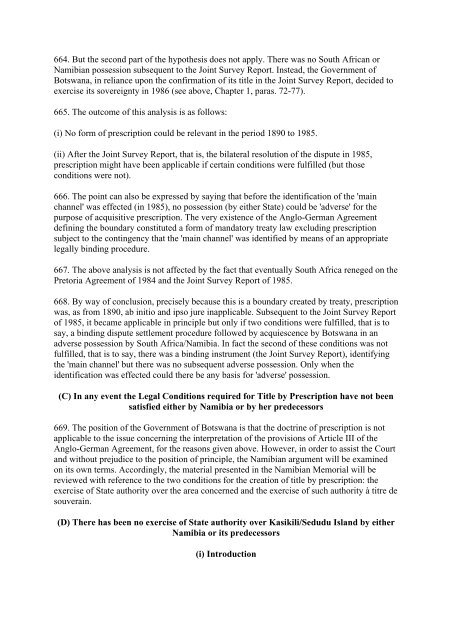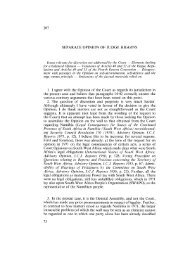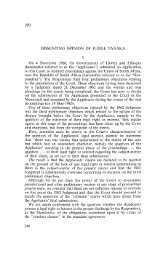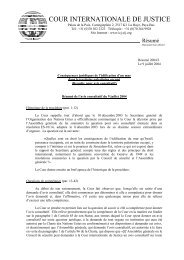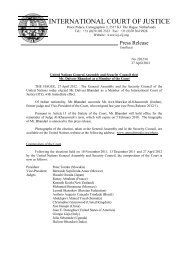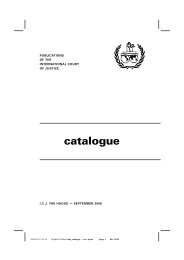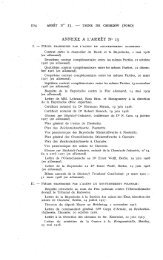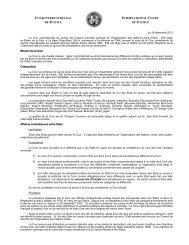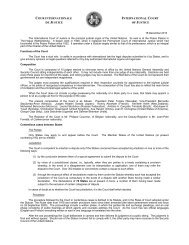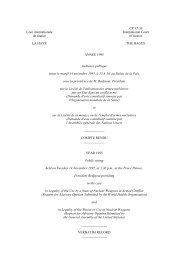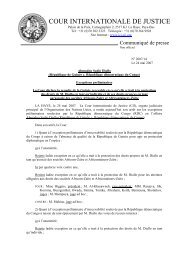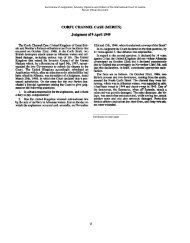botswana/namibia - Cour international de Justice
botswana/namibia - Cour international de Justice
botswana/namibia - Cour international de Justice
You also want an ePaper? Increase the reach of your titles
YUMPU automatically turns print PDFs into web optimized ePapers that Google loves.
664. But the second part of the hypothesis does not apply. There was no South African or<br />
Namibian possession subsequent to the Joint Survey Report. Instead, the Government of<br />
Botswana, in reliance upon the confirmation of its title in the Joint Survey Report, <strong>de</strong>ci<strong>de</strong>d to<br />
exercise its sovereignty in 1986 (see above, Chapter 1, paras. 72-77).<br />
665. The outcome of this analysis is as follows:<br />
(i) No form of prescription could be relevant in the period 1890 to 1985.<br />
(ii) After the Joint Survey Report, that is, the bilateral resolution of the dispute in 1985,<br />
prescription might have been applicable if certain conditions were fulfilled (but those<br />
conditions were not).<br />
666. The point can also be expressed by saying that before the i<strong>de</strong>ntification of the 'main<br />
channel' was effected (in 1985), no possession (by either State) could be 'adverse' for the<br />
purpose of acquisitive prescription. The very existence of the Anglo-German Agreement<br />
<strong>de</strong>fining the boundary constituted a form of mandatory treaty law excluding prescription<br />
subject to the contingency that the 'main channel' was i<strong>de</strong>ntified by means of an appropriate<br />
legally binding procedure.<br />
667. The above analysis is not affected by the fact that eventually South Africa reneged on the<br />
Pretoria Agreement of 1984 and the Joint Survey Report of 1985.<br />
668. By way of conclusion, precisely because this is a boundary created by treaty, prescription<br />
was, as from 1890, ab initio and ipso jure inapplicable. Subsequent to the Joint Survey Report<br />
of 1985, it became applicable in principle but only if two conditions were fulfilled, that is to<br />
say, a binding dispute settlement procedure followed by acquiescence by Botswana in an<br />
adverse possession by South Africa/Namibia. In fact the second of these conditions was not<br />
fulfilled, that is to say, there was a binding instrument (the Joint Survey Report), i<strong>de</strong>ntifying<br />
the 'main channel' but there was no subsequent adverse possession. Only when the<br />
i<strong>de</strong>ntification was effected could there be any basis for 'adverse' possession.<br />
(C) In any event the Legal Conditions required for Title by Prescription have not been<br />
satisfied either by Namibia or by her pre<strong>de</strong>cessors<br />
669. The position of the Government of Botswana is that the doctrine of prescription is not<br />
applicable to the issue concerning the interpretation of the provisions of Article III of the<br />
Anglo-German Agreement, for the reasons given above. However, in or<strong>de</strong>r to assist the <strong>Cour</strong>t<br />
and without prejudice to the position of principle, the Namibian argument will be examined<br />
on its own terms. Accordingly, the material presented in the Namibian Memorial will be<br />
reviewed with reference to the two conditions for the creation of title by prescription: the<br />
exercise of State authority over the area concerned and the exercise of such authority à titre <strong>de</strong><br />
souverain.<br />
(D) There has been no exercise of State authority over Kasikili/Sedudu Island by either<br />
Namibia or its pre<strong>de</strong>cessors<br />
(i) Introduction


